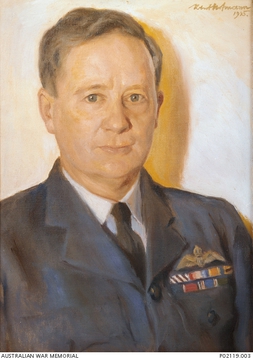WHITE, Thomas Walter
| Service Numbers: | Not yet discovered |
|---|---|
| Enlisted: | 1 April 1915 |
| Last Rank: | Captain |
| Last Unit: | Australian Flying Corps (AFC) |
| Born: | Hotham, Victoria, Australia, 26 April 1888 |
| Home Town: | Carlton, Melbourne, Victoria |
| Schooling: | Not yet discovered |
| Occupation: | Manufacturer |
| Died: | Heart attack, South Yarra, Victoria, Australia, 13 October 1957, aged 69 years |
| Cemetery: | Not yet discovered |
| Memorials: | Ballarat Australian Ex-Prisoners of War Memorial |
World War 1 Service
| 1 Apr 1915: | Enlisted AIF WW1, Captain, Australian Flying Corps (AFC) | |
|---|---|---|
| 20 Apr 1915: | Embarked Captain, Australian Flying Corps (AFC), RMS Morea, Melbourne | |
| 20 Apr 1915: | Involvement Captain, Australian Flying Corps (AFC), --- :embarkation_roll: roll_number: '1' embarkation_place: Melbourne embarkation_ship: RMS Morea embarkation_ship_number: '' public_note: '' | |
| 13 Nov 1915: | Imprisoned Captured near Bagdad, Prisoner of War in Turkey Escaped with RFC officer on 24/8/1918 | |
| 30 Nov 1916: | Honoured Mention in Dispatches, Mesoptamia. | |
| 6 Oct 1919: | Honoured Distinguished Flying Cross | |
| 6 Jan 1920: | Discharged AIF WW1, Captain, Australian Flying Corps (AFC) |
Help us honour Thomas Walter White's service by contributing information, stories, and images so that they can be preserved for future generations.
Add my storyBiography contributed by Evan Evans
AWM Summary
Thomas Walter White was born on 26 April 1888 at Hotham, VIC and was selected for the Australian Flying Corps first training course on 1 August 1914. He completed the course at the Central Flying School, Point Cook, and qualified as a pilot. Early in February 1915, the Indian Government requested the supply of an Australian air force unit to support the Indian Army's campaign in Mesopotamia. Forty-five men, including White, were selected and the group was named the Mesopotamia Half Flight.
On 1 April, White was promoted to captain and adjutant of the Half Flight. He embarked for India aboard RMS Morea on 20 April and transferred at Bombay for Basra, arriving there on 26 May. On 13 November, White and Captain Francis Yeats-Brown of the Royal Flying Corps took off on a mission to destroy the telegraph lines along the main road from Feludjah to Baghdad. However, their aircraft became entangled in the broken telegraph wires and they were subsequently captured and taken prisoner.
After being badly wounded by the Arabs who captured them, White and Yeats-Brown were taken to Baghdad then, after three weeks in hospital, including a week's solitary confinement, they were sent to Mosul. White was imprisoned at Mosul for two and a half months before being sent to Afion Kara Hissar, the principal prisoner of war camp in Turkey. White was imprisoned there for over two years.
On 26 July 1918, owing to an enquiry regarding his health, White was transferred to a hospital at Constantinople. After being discharged, White arranged to escape with Captain Alan Bott of the Royal Air Force. The pair succeeded on 24 August, when their train crashed while travelling over a viaduct at Kum Kapu. Taking advantage of the confusion, both men escaped but became separated. White then travelled by tram to Galata where he was joined by Captain Bott, who had also managed to evade his captors. The men decided to stow away in a Ukrainian steamer docked in Constantinople Harbour. The vessel remained at anchor for 33 days and the men spent an uncomfortable time below deck, sometimes hidden in the ship's ballast tanks.
Eventually the steamer reached Odessa a few days after the city's partial destruction by the explosion of an immense ammunition dump. White found a damaged Russian ammunition clip at the scene of the explosion. Armed with false Russian passports, White and Bott were able to remain in Odessa for a month. They had made arrangements to join the anti-Bolshevik army, but when they heard of the impending Armistice with Bulgaria, they stowed away in a Ukrainian hospital ship bound for Varna. Making their way through Bulgaria they reached Salonika only a week before the Armistice.
They disembarked at Port Said on 25 November 1918. For his services during the war, White was awarded the Distinguished Flying Cross on 3 June 1919 and Mentioned in Despatches in July. White returned to Australia via America, disembarking in Sydney on 5 January 1920.
After the war, he married Vera Deakin, founder of the Australian Red Cross Wounded and Missing Inquiry Bureau during the First World War and daughter of former Australian Prime Minister Alfred Deakin. White was the managing director of C.J. White & Sons between 1920 and 1932, during which time he entered into federal politics. In 1929, he eventually won the seat of Balaclava, which he held for twenty-two years.
In 1940, during the Second World War, White transferred from the Militia to the Citizen Air Force as a Squadron Leader. He went to England in 1941, where he acted as a liaison officer with the Royal Air Force and administered Australian aircrew. His passion for flying saw him join several operations covertly as second pilot. After years of public service in politics and civil organisations such as the Royal Life Saving Society, White died on 13 October 1957 and was buried in Point Lonsdale cemetery.













